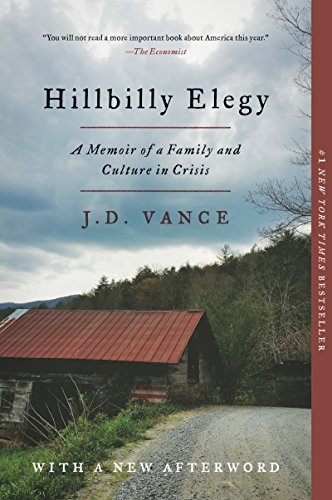

This article is an excerpt from the Shortform summary of "Hillbilly Elegy" by JD Vance. Shortform has the world's best summaries of books you should be reading.
Like this article? Sign up for a free trial here .
What was the “Hillbilly Highway”? How did this phenomenon start, and where?
The “Hillbilly Highway” is a name for stretches of U.S. Route 23 and Interstate 75. It earned its moniker from the mass migration of “hillbilly” families from Kentucky to the midwest in search of jobs.
We’ll cover how the “Hillbilly Highway” came to be and how JD Vance’s family arrives in Ohio in Hillbilly Elegy.
Origins of the Hillbilly Highway
To fully tell his story, JD has to begin by telling his family’s story. Mamaw and Papaw were raised in Jackson, Kentucky, which they left in the 1940s when Papaw found work in the Armco steelworks in Middletown, Ohio. They traveled the “Hillbilly Highway.”
Right from the outset, however, his family history was tinged with the loss, despair, and social dysfunction that would come to define so much of his own experience. Mamaw and Papaw left Jackson after Mamaw became pregnant as a teenager and gave birth to an infant who tragically passed away just a few days later. This tragedy, along with the burgeoning economic opportunities in southwest Ohio, compelled the young couple to uproot themselves and make their way out of Kentucky.
The Hillbilly Highway
Mamaw and Papaw were hardly alone in leaving the largely rural and undeveloped economy of that part of Kentucky during this time. Indeed, they were part of a mass exodus of young Appalachian families seeking opportunities in the fast-growing and rapidly industrializing Midwest. This exodus formed the Hillbilly Highway.
Companies like Armco, where Papaw found employment, actively recruited workers from the eastern Kentucky coal country where Vance’s family had its roots. These companies often encouraged and paid for men to bring their whole families with them, effectively transplanting entire communities.
The wave of migration was so common that stretches of U.S. Route 23 and Interstate 75 became colloquially known as the “Hillbilly Highway.” The numbers of people on the move were immense: by the 1950s, 13 percent of Kentucky residents had left the state.
Culture Clash
As with any wave of migration, the hillbilly migrants on the Hillbilly Highway brought their own culture and set of traditions to their new homes in the industrialized Midwest. Appalachian transplants established their own communities in these industrial towns and cities, often to the alarm of the more established middle class Ohioans.
The migrants from Kentucky on the Hillbilly Highway seemed to be people from an entirely different world. For the more bourgeois Midwesterners, the hillbillies were alien and destructive to community values:
They had too many children; they brought their extended families into their homes for visits that lasted too long, upsetting the peace, quiet, and normalcy of the community; and they were coarse, profane, and prone to violence.
The Toy Store Brawl
In one illustrative example of the clashes of people coming to town on the Hillbilly Highway, Vance recounts a story that subsequently became family legend. His grandparents were in a department store in Middletown with their son when the boy started to play with one of the toys on display.
When the clerk asked the boy to put the toy down and leave the store, Papaw and Mamaw went berserk: smashing the merchandise and physically threatening the clerk, saying “If you say another word to my son, I will break your fucking neck.”
This display of violent anger and utter disregard for social norms was shocking to the Ohioans who witnessed the scene, but it was a matter of basic pride for Vance’s family. The parents were merely defending his son against a stranger who had slighted the family’s honor by telling him where he could and couldn’t go. This was just what any self-respecting hillbilly would do when an outsider messed with their child.
Shortform note: This scene of violence and anger in response to a relatively mild slight may have its roots in what historians and sociologists have called the “Southern culture of honor.” It’s characterized by an extreme unwillingness to tolerate personal insults of any kind and a high propensity, particularly on the part of males, to defend one’s reputation with violence.
Honor cultures are common in places where the rule of law and the control of centralized authorities have been historically weak: like the remote parts of the British Isles from which the hillbillies’ Scots-Irish ancestors came. These values were easily transplanted to the remote, rugged world of Appalachia. In turn, the hillbillies brought these values with them when they migrated to other regions of the United States.
For more on culture of honor, see our summary of Outliers by Malcolm Gladwell.
“You Can’t Take Kentucky Out Of The Boy”
Interestingly, Vance observes that the Ohioans seemed to view the transplanted hillbilly community from the Hillbilly Highway as being almost racially different, despite the migrants being just as white as their neighbors.
To the Ohioans, the hillbillies from the “Hillbilly Highway” shared many behavioral and cultural characteristics with the black migrants who came up from the South to settle in Detroit, Chicago, St. Louis, Cincinnati, and other industrial Midwestern cities during the great black migrations of the postwar era.
This experience shows that culture is not stationary: your values and upbringing will follow you wherever you go. This was certainly true for the transplanted Kentuckians on the Hillbilly Highway: they didn’t leave their way of life behind when they left their native communities, they simply brought them to a new location.
Mamaw summed it up pithily by saying, “you can take the boy out of Kentucky, but you can’t take Kentucky out of the boy.”
———End of Preview———

Like what you just read? Read the rest of the world's best summary of "Hillbilly Elegy" at Shortform . Learn the book's critical concepts in 20 minutes or less .
Here's what you'll find in our full Hillbilly Elegy summary :
- The hallmarks of hillbilly culture and why they hold people back
- How JD Vance broke out of his hillbilly childhood and graduated from Yale
- Why the author thinks hillbillies might be beyond saving






